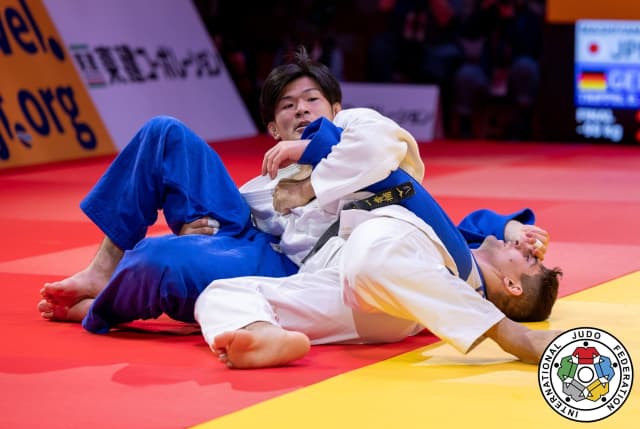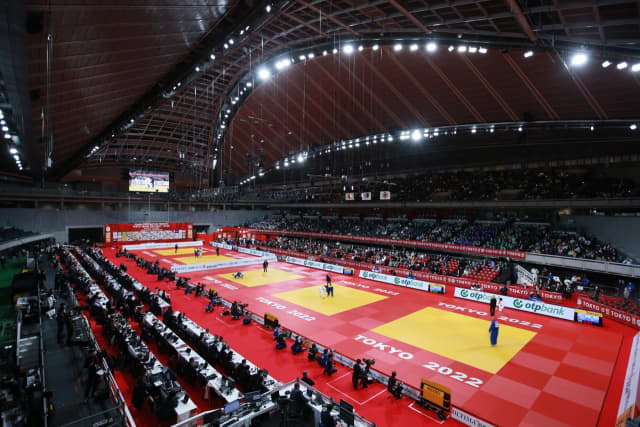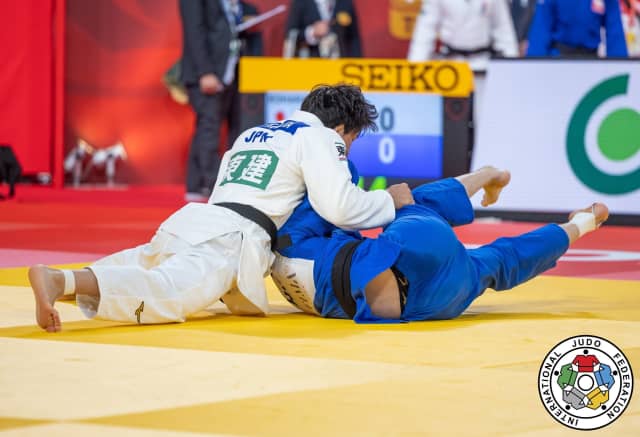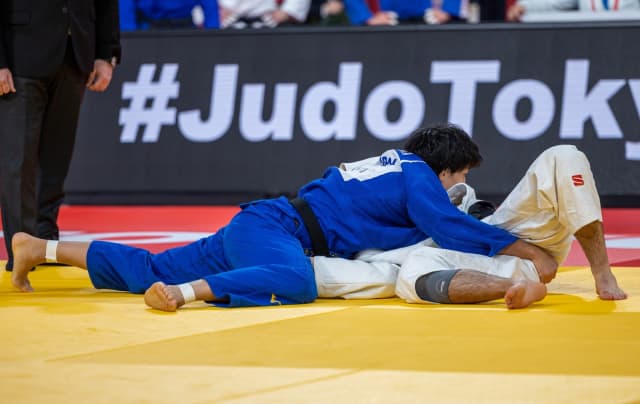“The return of the Tokyo Grand Slam in 2022 brings with it a change of format from previous 2-day grand slams and on day 1 the 6 middleweight categories opened the event in style, providing the perfect balance of technique, speed and strength to delight the knowledgeable home crowd.
As is typical for Japan at their home grand slam, where 4 competitors can be entered, they dominated the podia, taking a staggering 17 of the available 24 medals, once again demonstrating not just the perks of home advantage but primarily the sheer strength-in-depth of their squad.
One notable element of the team’s performance on day 1 was the high level of transition into ne-waza from tachi-waza on display, particularly noticeable from the men. When discussing the prowess of the Japanese team on the ground, we typically point to the capabilities and achievements of the women’s team, world-famous and even feared for their grappling exploits. Many often spend minutes at a time hounding their opponents on the floor. This time around, however, the men were more than a match for the women, finishing a significant number of their contests on the ground and finishing them quickly, too.
Kenya Kohara has been absent from the world tour for nearly 4 years but on the back of winning his 3rd Kodokan Cup title, in October, he was unstoppable in the under -81kg category. Winning all but one of his six fights with a score, he was relentless, finishing three of his opponents with rapid transitions to osae-komi. In round 1 he followed a de-ashi-barai attempt on Mylonelis (GRE) with a swift sankaku turnover. He then dispatched Lee (HKG) in under a minute in round 2, countering a failed dropping attempt by his opponent with a tightly-coiled okuri-eri-jime, causing Lee to submit while being held down."
"An o-soto-gari in round 3 scored him a waza-ari against Makhmadbekov (TJK), which he followed with a smooth knee slide to bypass the legs and finish with another hold. His trusty o-soto-gari also defeated compatriot Fujiwara in the semi-final and a crafty sumi-gaeshi counter in the final against Olympic champion Nagase rounded off a flawless performance and secured Kohara a maiden grand slam title.
In the under -73kg category, Ken Oyoshi was the epitome of composure as he took his third grand slam medal from 3 attempts, this time a bronze. Oyoshi relied on some skilful transitions to juji-gatame to both finish off opponents and claw back victory from the jaws of defeat. Against Cardoso (MEX) in the round of 32, he scored waza-ari with a two-footed tomoe-nage before latching onto uke’s outstretched arm to submit him. In his quarter-final he came up against Kang (KOR), an exciting fighter who had just sent current world champion Tsend-Ochir (MGL) home, in the previous round. Oyoshi struggled with the Korean’s dynamism and picked up a second shido in the early seconds of golden score. Nevertheless, he remained calm, continually hunting for the armlock when the fight hit the deck, before finding an opening and rolling the Korean over, maintaining good pressure to release the arm and snatch the win from the Korean’s grasp.
Elsewhere, the under -90kg category saw the return of Rio Olympic Champion Mashu Baker, not seen on the IJF World Judo Tour since the last edition of the Japanese grand slam, in Osaka in 2019. Baker, too, produced some slick transitions, first following up from sumi-gaeshi with yoko-shiho-gatame against Visan (ROU) and then evading a sumi-gaeshi attempt by Ngayap Hambou (FRA) and again securing the side four quarters hold for ippon."
"In his quarter-final, however, Baker found himself on the end of a smooth juji-gatame transition by eventual silver medallist Trippel (GER). In addition to his usual powerful throws, Takeshi Sasaki produced an acrobatic transition in the under 81kg category, spinning out of Gerbekov’s (BRN) sumi-gaeshi attempt to land in osae-komi and take the win. However, despite their valiant efforts on the day, both players had to settle for 5th place."

"The entire Japanese team produced a typically dazzling array of throws on day 1 and the women continued to display their dominance in ne-waza, creating and converting opportunities on the ground at every turn. Whereas often the men prefer to dispatch their opponents with a dramatic throw, today they showed a different side, taking every available chance to transition fluidly from standing to the ground. Perhaps the success of the women and the additional time being given by referees is behind this renewed effort to hunt for the ippon, whatever form it takes.”



